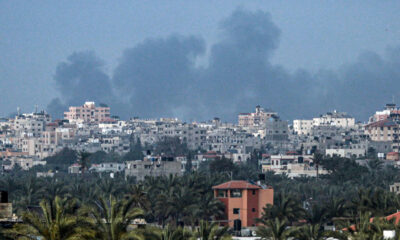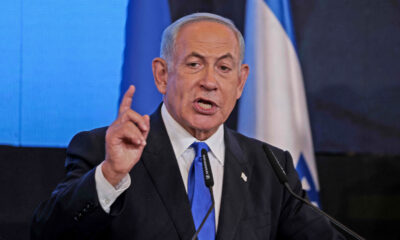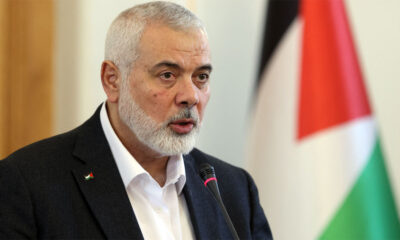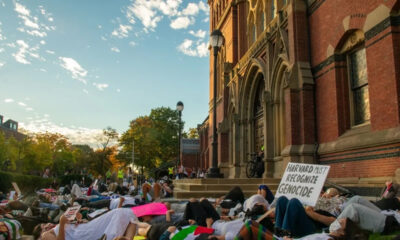International
Israel retaliation kills 230 Palestinians after Hamas operation

Israel retaliation kills 230 Palestinians after Hamas operation
At least 232 people have been killed and 1,600 wounded in the Palestinian enclave of Gaza during Israel’s retaliation after a deadly multi-pronged attack by Hamas forces into Israel, the health ministry says.
The growing casualty toll on Saturday came after the Palestinian group running the Gaza Strip launched the largest attack on Israel in years, infiltrating areas in the south of the country following a barrage of thousands of rockets fired from the besieged territory.
Israel’s national rescue service said at least 250 people were killed and hundreds wounded, making it the deadliest attack in Israel in years. An unknown number of Israeli soldiers and civilians were also seized and taken into Gaza.
Hamas and Israel said late on Saturday that gun battles were raging in dozens of areas inside Israeli territory.
Israel’s Defence Minister Yoav Gallant warned Hamas it made a “grave mistake” in launching the attack, which began at 6:30am local time (03:30 GMT) and involved barrages of rockets fired from multiple locations in Gaza as well as fighters infiltrating Israel by land, sea and air.
“Citizens of Israel, we are at war. The enemy will pay an unprecedented price,” Israeli Prime Minister Benjamin Netanyahu said in a video message from military headquarters in Tel Aviv.
Israel’s military launched a series of air raids on Gaza in response to the attack. “Dozens of [Israeli military] fighter jets are currently striking a number of targets belonging to the Hamas terrorist organisation in the Gaza Strip,” it said.
Mohammed Deif, a senior Hamas military commander, said the rocket fire marked the start of “Operation Al-Aqsa Flood”, and he called on Palestinians everywhere to fight the Israeli occupation.
READ ALSO:
-
Davido replies Ex-NFF president, Pinnick over failure to perform in Warri despite $94,600 payment
-
NDLEA debunks police claim over inquiry on arrest, detention of Mohbad
-
BREAKING: INEC reverses withdrawal of appeal in Kano Gubernatorial election petition
“We’ve decided to say enough is enough,” Deif said as he urged all Palestinians to confront Israel. “This is the day of the greatest battle to end the last occupation on Earth,” he said in an audio message.
Israel’s military told Israelis living around the Gaza Strip to stay in their homes and warned Hamas would pay a “heavy price for its actions”.
Israeli media reported Palestinian fighters opened fire on passers-by in the town of Sderot, in southern Israel, and footage circulating on social media appeared to show uniformed Palestinians engaged in clashes.
Another video on social media appeared to show a burning Israeli tank surrounded by jubilant Palestinians.
Israeli warplanes started to pound locations in Gaza – in what the military called “Operation Iron Swords” – and Israeli soldiers were engaged in ground fighting in several locations around the besieged Palestinian enclave.
“Right now we’re fighting. We’re fighting in certain locations around the Gaza Strip… Our forces are now fighting on the ground,” Israel’s army spokesman Richard Hecht told reporters.
‘We haven’t seen this before’
Witnesses in Gaza heard loud explosions.
Enas Keshta, a resident of Rafah in southern Gaza, said Palestinians are looking at a “tough night” ahead as Israeli attacks on the blockaded enclave continue.
“The situation here in Gaza is not good at all. I can assure you that we are not ready, and we have a tough night waiting for us,” she told Al Jazeera. “No place is safe.”
Widespread shock and fear abounds in Gaza.
“We have been as surprised and frightened as the [occupation] since the operation began,” said Munir Nasser, a Gaza grocery vendor. “We haven’t seen footage of Palestinians breaching the occupied towns and villages beyond the barriers like this before.”
‘Dangerous precipice’
The outbreak of major fighting between Israeli forces and Palestinian fighters comes after weeks of growing tensions along Israel’s volatile border with Gaza, and months of deadly clashes in the Israeli-occupied West Bank.
At least 247 Palestinians have been killed by Israeli forces so far this year, while 32 Israelis and two foreign nationals have been killed in previous Palestinian attacks.
Tor Wennesland, United Nations special coordinator for the Middle East Peace Process, condemned “the multi-front assault against” Israeli towns and cities near Gaza, which he called “heinous attacks targeting civilians”.
“These events have resulted in horrific scenes of violence and many Israeli fatalities and injuries, with many believed to be kidnapped inside the Strip. These are heinous attacks targeting civilians and must stop immediately,” Wennesland said in a statement.
READ ALSO:
- FG suspends N-Power program indefinitely, begins investigation
-
BREAKING : Over 40 Israelis killed after surprise attacks by Hamas
-
US Govt announces opening of Visa Lottery application, bars Nigeria
-
NSCDC arrests 45 suspected criminals in Kano
“I am deeply concerned for the well-being of all civilians. I am in close contact with all concerned to urge maximum restraint and call on all sides to protect civilians,” he said.
“This is a dangerous precipice and I appeal to all to pull back from the brink.”
I vehemently condemn the multi-front assault against Israeli towns & cities near #Gaza, & barrage of rockets reaching across central #Israel by Hamas militants. These are heinous attacks targeting civilians & must stop immediately.
🔗https://t.co/S8Dyvjxo6k
My full statement👇 pic.twitter.com/fz2aJWUsGW— Tor Wennesland (@TWennesland) October 7, 2023
‘On the verge of great victory’
In a statement posted on the Telegram messaging app, Hamas called on “the resistance fighters in the West Bank” as well as “our Arab and Islamic nations” to join the fight.
Saleh al-Arouri, an exiled Hamas leader, said “Operation Al-Aqsa Flood” was a response “to the crimes of the occupation” and Palestinian fighters were defending their sacred site in occupied East Jerusalem.
Lebanon’s Hezbollah movement, which was founded in 1982 to fight the Israeli occupation of southern Lebanon, said in a statement it was following the events in Gaza closely and was in “direct contact with the leadership of the Palestinian resistance”.
Ismail Haniyeh, the leader of Hamas, told fellow Arab countries that Israel cannot provide protection despite recent diplomatic rapprochements.
“We say to all countries, including our Arab brothers, that this entity, which cannot protect itself in the face of resistors, cannot provide you with any protection,” he said. “All the normalisation agreements that you signed with that entity cannot resolve this [Palestinian] conflict.”
In a speech broadcast on Hamas-run Al-Aqsa television, Haniyeh added: “We are on the verge of a great victory and a clear conquest on the Gaza front. Enough is enough, the cycle of intifadas [uprisings] and revolutions in the battle to liberate our land and our prisoners languishing in occupation [Israeli] prisons must be completed.”
aljazeera
International
In Texas, pro-Palestine university protesters clash with state leaders
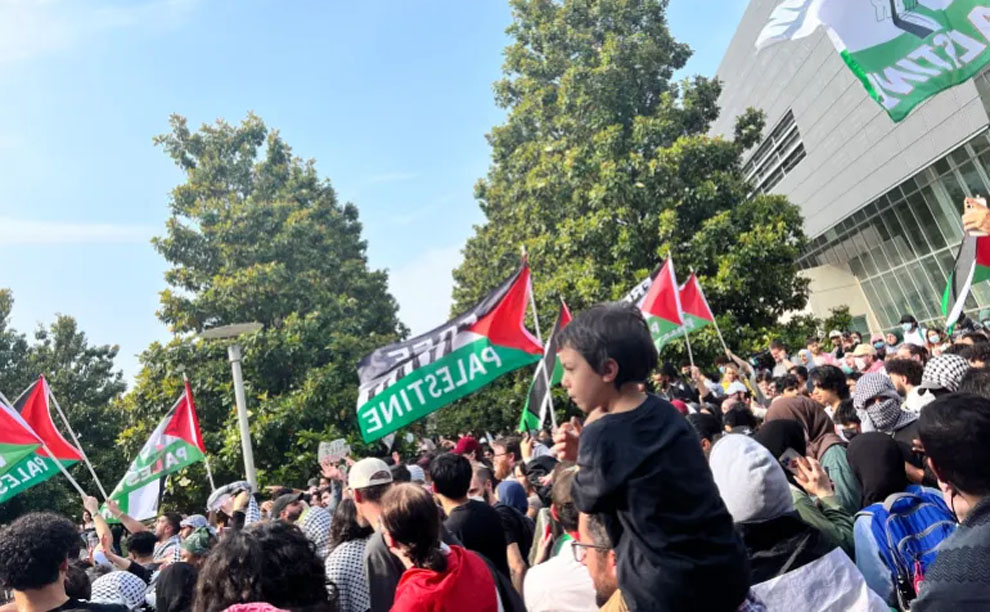
In Texas, pro-Palestine university protesters clash with state leaders
Austin, Texas – “It didn’t feel real.” That’s how Alishba Javaid, a student at the University of Texas at Austin, describes the moment when she saw roughly 30 state troopers walk onto the campus lawn.
Javaid and hundreds of her classmates had gathered on the grass, in the shadow of the campus’s 94-metre limestone tower, as part of a walkout against Israel’s war in Gaza.
They were hoping that their school would divest from manufacturers supplying weapons to Israel. Instead, law enforcement started to appear in increasing numbers.
By Javaid’s count, the state troopers joined at least 50 fellow officers already in place, all dressed in riot gear. The protest had been peaceful, but nerves were at a high. The troopers continued their advance.
“That was the first moment I was genuinely scared,” said Javaid, 22.
Dozens of students were ultimately arrested on April 24, as the officers attempted to disperse the protesters. Footage of the clashes between police and demonstrators quickly spread online, echoing images from other campus protests across the United States.
Yet, Texans face a unique challenge, as they contend with a far-right state government that has sought to limit protests against Israel.
READ ALSO:
- Palestinian doctor dies in Israeli prison
- Ganduje shares cash to 400 PWDs
- Police arrest four ex-convicts for robbery in Niger
In 2017, Governor Greg Abbott signed a law that prohibits government entities from working with businesses that boycott Israel, and the state has since taken steps to tighten that law further.
Abbott has also cast the current protests as “hate-filled” and “anti-Semitic”, amplifying misconceptions about demonstrators and their goals.
In addition, a state law went into effect earlier this year that forced public universities to shutter their diversity, equity and inclusion (DEI) offices.
Multiple students and employees told Al Jazeera that campuses have become less safe for people of colour as a result of the law, which forced the departure of staff DEI advocates.
‘Using violence to subvert minorities’
The violence has continued at University of Texas campuses as students press forward with their protests.
On the final day of class, April 29, police used pepper spray and flash-bang devices to clear a crowd at the Austin campus, while dozens more were encircled by troopers and dragged away screaming.
Hiba Faruqi, a 21-year-old student, said her knee “just kept bleeding” after she was knocked over during a pushing-and-shoving match between students and police.
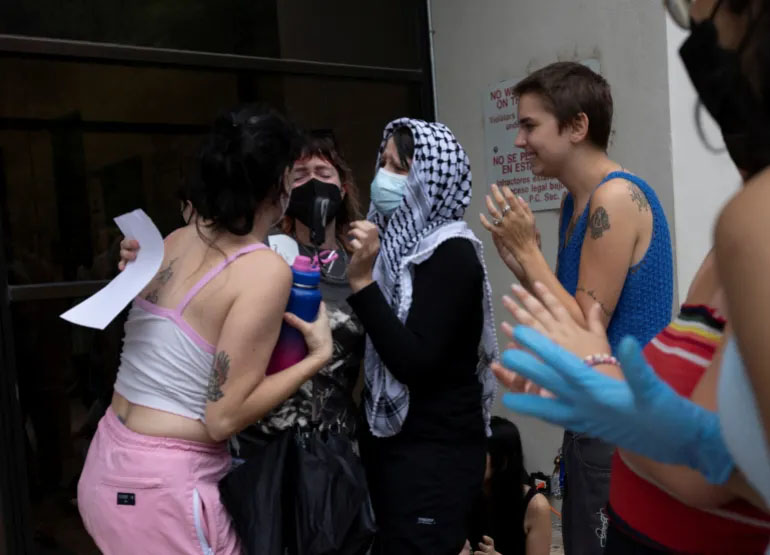
Student protesters applaud one another as they are released from the Travis County Jail in Austin, Texas, on April 30 [Nuri Vallbona/Reuters]
Yet she counts herself lucky for not sustaining worse injuries. It was surreal, she said, to think that her own university called in state troopers — and then had to deploy medical personnel to assist students who were hurt.
“There’s a racist element people don’t want to talk about here,” she said. “There’s a xenophobic element people don’t want to acknowledge. There are more brown protesters, which maybe emboldens the police to do things a certain way.”
As calls for divestment continue, students, lawyers and advocates told Al Jazeera they have been forced to navigate scepticism and outright hostility from the Texas government.
READ ALSO:
- US congressman, wife charged with $600,000 bribe tied to Azerbaijan, Mexican bank
- Don’t host US, French military bases in Nigeria, northern leaders warn Tinubu
- Osun kingship Tussle: Court stops coronation of Gov Adeleke-appointed king
“Texas is known for using violence to subvert minorities,” Faruqi said. “The reason this is shaking people this time is because it’s not working.”
Scrutiny over university endowments
Many of the protests have zeroed in on the University of Texas’s endowment, a bank of funds designed to support its nine campuses over the long term.
The University of Texas system has the largest public education endowment in the country, worth more than $40bn.
Some of that money comes from investments in weapons and defence contractors, as well as aerospace, energy and defence technology companies with deep ties to Israel.
ExxonMobil, for example, is one of the biggest beneficiaries of the system’s investments, and the company has supplied Israel with fuel for its fighter jets.
Those ties have fuelled the protests across the state’s public university campuses, including a May 1 demonstration at the University of Texas at Dallas.
Fatima — who only shared her first name with Al Jazeera, out of fear for her safety — was among the demonstrators. She wiped sweat from her brow as a young child led the crowd of about 100 in a series of chants: “Free, free, free Palestine!”
The divestment protests have largely been peaceful, Fatima explained, raising her voice to be heard above the noise.
“Over 30,000 people have been murdered,” she said, referring to the death toll in Gaza, where Israel’s military campaign is entering its eighth month.
“And our university is investing in weapons manufacturing companies that are providing Israel with these weapons. We’re going to stay here until our demands are met.”
Twenty-one students and staff members were arrested that day in Dallas. Members of the group Students for Justice in Palestine, of which Fatima is a member, spent the night outside the county jail, waiting for their friends to be released.

One protester wryly noted outside the jail that they had been arrested for trespassing on their own campus, a seemingly nonsensical offence.
READ ALSO:
- We have added 625MW to national grid – Minister
- Minimum wage, maximum deceit and moral cowardice – Farooq Kperogi
- EFCC nabs 20 suspected internet fraudsters in Sapele
- Nigerian pastor under fire over porn-addiction remedy
In the background, a thunderstorm was beginning to rear its head, so the protesters huddled closer together under the awning.
Protesters receive community support
Texas officials and university administrators have justified the police crackdowns, in part, by citing the presence of outsiders with no present affiliation with the campuses involved.
But 30-year-old activist Anissa Jaqaman is among those visiting the university protests, in an effort to lend supplies and support.
Everyone has a role to play, Jaqaman explained: Her role is sometimes that of the communicator, but more often that of the healer.
She has brought water to the student demonstrators at the University of Texas at Dallas and hopes to provide a space for people to “come over and talk about how we heal”.
“This is a healing movement,” she said time and again as she spoke to Al Jazeera. “We have to carry each other.”
Jaqaman is Texas through and through: She was raised in the Dallas suburbs and is a strong advocate for her state.
“I’m a proud Texan,” she said. “I actually think that Texans are some of the nicest people in the country.”
But back when she was in college, from 2012 to 2016, Jaqaman started to use her voice to bring awareness to the plight of Palestinians.
Rights groups have long warned that Israel has imposed a system of apartheid against the ethnic group, subjecting its members to discrimination and displacement.
In college, Jaqaman’s friends often laughed at her passion. She often smiles, exuding optimism, but her voice grows serious as she talks about Palestine, as well as other issues like the scourge of single-use plastics.
“They just thought I was a tree-hugger, but for human rights,” she explained, speaking in a soft yet confident voice.
But the current war has amplified her concerns. The United Nations has signalled famine is “imminent” in parts of Gaza, and rights experts have pointed to a “risk of genocide” in the Palestinian enclave.
Jaqaman has sported her keffiyeh scarf ever since the war began on October 7, despite feeling anxious that it could attract violence against her.
“I wear it because I feel like it protects my heart, honestly,” she said. “I feel like I’m doing the Palestinian people injustice by not wearing it.”
But she has struggled to get public officials to engage with her concerns about the war and divestment from industries tied to Israel’s military. For months, she attempted to persuade her local city council that “this is a human issue, an everyone issue”, to little avail.
“Everything that we’re seeing right now is about shutting down the discussion,” she said. “If you say anything about Palestine, you’re labelled anti-Semitic. That’s a conversation-ender.”
Youth protesters look to the future
Students like Javaid, a journalism major in her final semester, told Al Jazeera that they are still trying to figure out what healing looks like — and what their futures might hold. In many ways, she and her friends feel stuck.
They recognise they need to take a break from scouring social media for information about the war, and yet it is all they can think about.
The usual college rites of passage — final exams, graduation and job hunting — just don’t seem as important any more.
“How are we supposed to go back to work now?” Javaid asked after the protests.
While she has treasured her time at the university, she is also highly critical of its actions to stamp out the protests. Part of the blame, she added, lies with the government, though.
“The root issue in Texas is that the state government doesn’t care,” she said.
Born and raised in the Dallas area, Javaid plans to stay in Texas for at least a little while after she graduates this month. She has mixed feelings about staying long term, though.
She would like to work in social justice, particularly in higher education, but she worries such a job would be tenuous in her home state.
Still, she feels a sense of responsibility tying her to the state. The political climate in Texas may be challenging, she said, but she has a duty — to her fellow protesters and to Palestine — to keep playing a role.
“I don’t want to jump ship and just say, ‘Texas is crazy’,” Javaid said. “I want to be a part of the people trying to make it better. Because if not us, who?”
In Texas, pro-Palestine university protesters clash with state leaders
SOURCE: AL JAZEERA
International
Palestinian doctor dies in Israeli prison
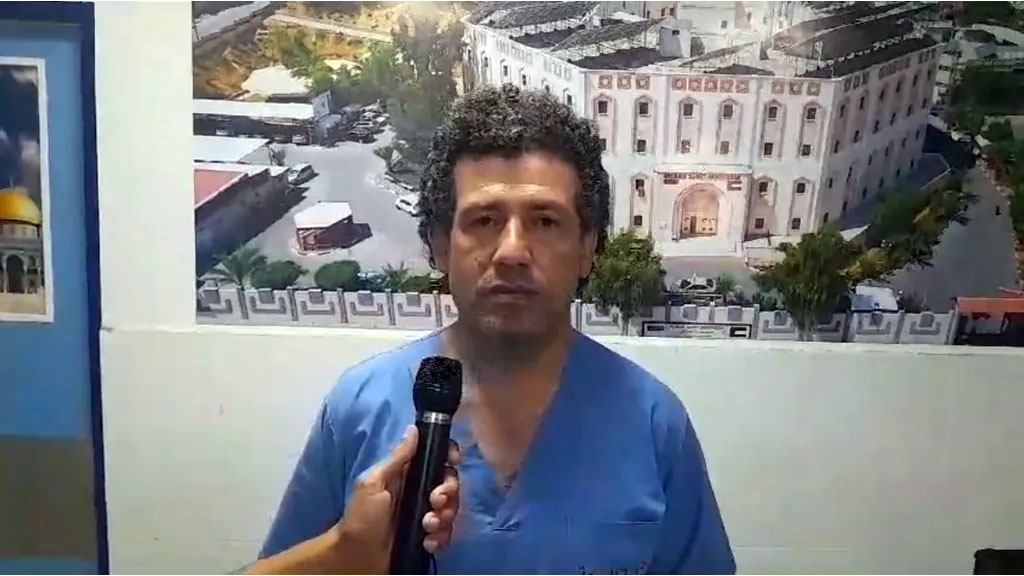
Palestinian doctor dies in Israeli prison
A Palestinian doctor has died in an Israeli prison after more than four months in detention, Palestinian prisoner associations have said.
Dr Adnan Al-Bursh, 50, was the head of orthopaedics at al-Shifa Hospital.
The Israeli prison service confirmed that a statement published on 19 April about a prisoner who was detained for national security reasons and had died in Ofer prison was Dr Al-Bursh.
No details were given on the cause of death, and the prison service said the incident was being investigated.
But the Palestinian prisoner advocacy groups said in a joint statement on Thursday that Dr Al-Bursh’s death was an “assassination” and his body still remained in Israeli custody.
Dr Al-Bursh was the head of orthopaedics at Gaza’s largest medical facility, al-Shifa hospital, which has been raided several times by Israeli armed forces.
He was temporarily working at Al-Awada hospital in north Gaza when he was detained by Israeli forces.
Colleagues have paid tribute to the late surgeon, describing him as “compassionate” and “heroic”.
Al-Shifa’s director, Dr Marwan Abu Saada, said the news of his death was difficult for the human soul to bear.
Another colleague, Dr Suhail Matar, called Dr Al-Bursh “the safety valve” for every orthopaedic department in all of Gaza’s hospitals.
READ ALSO:
- Ganduje shares cash to 400 PWDs
- Police arrest four ex-convicts for robbery in Niger
- US congressman, wife charged with $600,000 bribe tied to Azerbaijan, Mexican bank
“It is rare that you meet a person like him in your life, because this doctor worked all his life with dedication and used to make tremendous efforts at the expense of himself,” Dr Matar told BBC Arabic’s Gaza Lifeline programme.
He described his late colleague as someone who was never tired of working, and who was “loved by everyone and his smile never went away”.
Francesca Albanese, the UN Special Rapporteur on the human rights situation in the West Bank and Gaza, said she was “extremely alarmed” by news of Dr Al-Bursh’s death and called on the diplomatic community to take concrete measures to protect Palestinians.
Meanwhile White House spokeswoman Karine Jean-Pierre said President Joe Biden has discussed with Israel the importance of protecting humanitarian workers in Gaza.
“The president has said very clearly that when it comes to people who are… in Gaza providing that all-important care, humanitarian aid, humanitarian care, they need to be protected. They should be protected. And so certainly those conversations are going to continue,” she said.
“We believe that certainly… the Israeli government has taken efforts to do just that and has taken into account our concerns and so we’re going to continue to have those conversations but it is heartbreaking to hear.”
Gaza’s Hamas-run health ministry said in a statement that Dr Al-Bursh’s death meant that the total number of medical workers who had been killed by Israel since the 7 October attack now stands at 496.
It added that 1,500 others had been wounded while 309 had been arrested.
Medical facilities are protected under international law, but Israel says Hamas uses them as cover for military operations – something Hamas denies.
The BBC has approached the Israel Defense Forces (IDF) for comment.
Palestinian doctor dies in Israeli prison
BBC
International
US congressman, wife charged with $600,000 bribe tied to Azerbaijan, Mexican bank
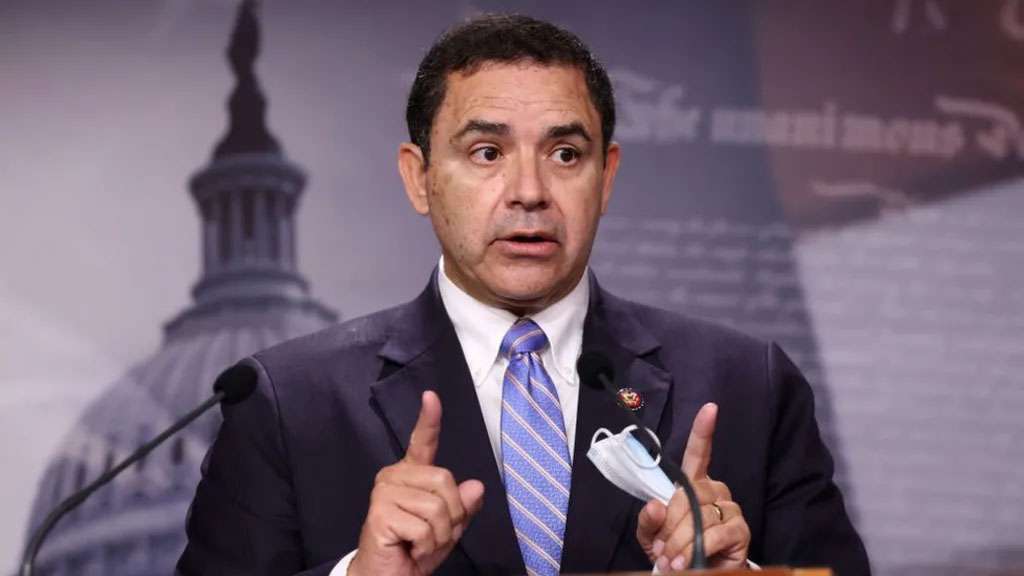
US congressman, wife charged with $600,000 bribe tied to Azerbaijan, Mexican bank
US congressman Henry Cuellar and his wife have been charged with accepting around $600,000 (£478,000) in bribes, the justice department says.
It is alleged the couple corruptly received money from an Azerbaijani government-owned oil company and a Mexican bank.
The Texas Democrat has denied the charges in a statement.
The couple were bailed after appearing in court in Houston. If found guilty, they could face decades in prison.
“I want to be clear that both my wife and I are innocent of these allegations,” Mr Cuellar, 68, said on Friday.
The couple are each charged with multiple counts of conspiracy, bribery, wire fraud, money laundering and violating a ban on acting as agents of a foreign organisation.
The justice department said bribes were laundered from 2014-21 via a series of “sham consulting contracts” through middlemen and front companies owned by Imelda Cuellar, 67.
In exchange for the money, the indictment alleges Mr Cuellar agreed to influence US foreign policy in favour of Azerbaijan and push measures beneficial to the bank headquartered in Mexico City, including changes to money-laundering laws and attempts to block regulation of the payday lending industry.
The Cuellars allegedly used the proceeds from the bribery schemes to pay off a number of debts and make purchases for their family.
READ ALSO:
Among the outgoings were more than $58,000 (£46,000) on credit card payments, some $11,000 in car payments, $18,000 at wholesale stores and $12,000 for a custom gown, according to the indictment.
Senator Robert Menendez, a New Jersey Democrat, faces similar charges. He and his wife are accused of taking bribes in exchange for the senator using his influence to benefit the governments of Egypt and Qatar.
In the statement released by his office, Mr Cuellar vowed to keep campaigning for re-election in November.
“Before I took any action, I proactively sought legal advice from the House Ethics Committee, who gave me more than one written opinion, along with an additional opinion from a national law firm,” he said.
“The actions I took in Congress were consistent with the actions of many of my colleagues and in the interest of the American people.”
Mr Cuellar was a lawyer and former customs broker before entering politics. He was first elected to Congress in 2004 and is a former co-chair of the Congressional Azerbaijan Caucus.
Hakeem Jeffries, Democratic party leader in the House of Representatives, said Mr Cuellar would take a leave of absence from his post on a homeland security subcommittee while the case continues.
Mr Cuellar’s home and campaign office in Laredo were raided in January 2022.
Authorities said at the time the raid was part of a federal investigation into Azerbaijan and US businessmen who have links to the country.
Mr Cuellar is widely considered a centrist and has been described as the lone anti-abortion House Democrat.
In 2022, he narrowly survived a primary challenge from a progressive candidate, Jessica Cisneros, who once worked as an intern in his office.
US congressman, wife charged with $600,000 bribe tied to Azerbaijan, Mexican bank
BBC
-

 Africa3 days ago
Africa3 days agoMan who has lived in America for over 13 years says he’s tired, wants to return home
-

 metro3 days ago
metro3 days agoTerrorists release video of kidnapped palace servant, others in Zamfara
-

 metro2 days ago
metro2 days agoSecurity forces, vigilantes arrest kidnapper terrorising communities in Kogi
-

 metro2 days ago
metro2 days ago19-year-old boy convicted for impregnating 14-year-old sister
-

 metro2 days ago
metro2 days agoNeighbour, son beat mother of four to death in Edo
-

 News2 days ago
News2 days agoDrama as Delta workers boo Gov Oborevwori over minimum wage
-
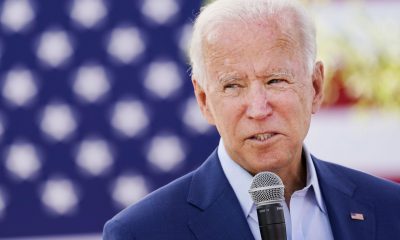
 International1 day ago
International1 day agoUS students slam Biden’s comments on Gaza encampments
-

 metro2 days ago
metro2 days agoBREAKING: EFCC, Cubana Chief Priest agree to settle out of court

